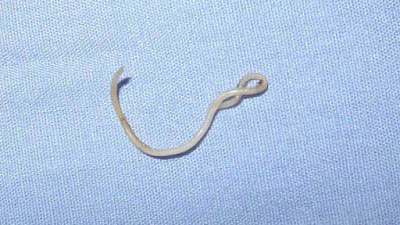Different worm types in dogs with symptoms, damage and treatment
There are main 4 worm types in dogs, they are hookworm, roundworm, tapeworm and whipworms. Apart from that heartworm is also a cause of concern in pets because it can affect heart and other vital circulatory organs. Flatworms are also dangerous because they damage lungs as well as kidneys.
Let's see each of these types below with details needed.
Let's see each of these types below with details needed.
1) Roundworms:
The most common worm present in dogs is roundworms. They appear like noodles and hence termed as roundworms. They are also termed as nematodes clinically. They spread from one dog to another when contaminated feces is ingested. Pregnant mother also them to the puppies leading to puppy worms.
They can spread to humans as well. So family with children should always get child checked for it; when dog had infestation.
2) Hookworms:
They are given this name because of hook like structures. Hookworms in dogs are also very common. Their transmission happens via fecal touch, or through open wounds, skin cracks. Dog hookworms are more common in adults than the puppies.
3) Whipworms:
They are less common than the prior two. And as you can see from below image; their name is derived from their shape. They can cause sever issues in your pet and they are found both in puppies and adult dogs. They adhere their bodies to intestinal lining and suck blood from the host. They have capacity of causing blood loss to an extent that your dog can be severely anemic. Their multiplication takes place in intestinal parts of the body.
4) Tapeworms:
Their name is also derived from their shape. Unlike other worms; they are spread through fleas. Fleas contain immature worms which are transmitted from one dog to another. These worms have segments on their bodies called as proglottids which are easily breaking. Proglottids can be seen crawling in stools of the dog and on the fur near anus area. When these worms dry outside dog body; they leave behind yellow hard eggs.
5) Flatworms:
They are also termed as Flukes or trematodes. Just like hookworms, they also often stuck to intestinal walls, as well as lungs and liver. They are infested in dogs via contaminated feces, frogs and snails (if your dog eats them of course!)
6) Heartworms:
They are one of the most fatal worms (in advanced stages) in dogs. They can penetrate in and grow in the heart muscles. Main issue with this worm infestation is the silent! Infested dogs does not show signs and symptoms for months or years. And during this time much of the damage to heart tissues is already caused.
Heartworm infested dogs coughs after exertion and excitement. Later stages of infestation leads to difficulty in breathing. This infestation can be diagnosed by blood test and x rays can be used to check severity of the infestation.
They are spread via bite of infected mosquito. Treatment of dog heartworm is a hard task because worms are also present in arteries and veins.
7) Ringworm:
Actually it is not a worm infection. It is fungal infection of dog skin. But as the rashes appear as worms; some people call it as ringworm infestation. (So we thought of adding it in the list!)
Diagnosis and symptoms of worms in dogs:
This is tough most the times. Worms can stay un-noticed for months and you would not detect them in stools too. It is a misconception that worms will definitely show up in stools. At times dogs only excrete worm eggs and not worms. And it is impossible to detect those microscopical eggs with human eyes.
Microscopical examination of dog stool by veterinarian can confirm the worms presence in dog body. Apart from that other symptoms worms are anorexia or increased food intake, mental issues in dogs, scooting effect and of course presence of worms in stools. Most of the times worm infested dogs have smelly stools.
Treatment:
- Treating your dog with broad spectrum dewormer is advisable. Normally vets give febendazole along with praziquantel.
- It is also advised to give a diet supplement when worms are plenty in number or different types of worms are present.
- For heartworm: As we said it is hard to treat. But there are various methods used to improve cardiac functions and blood circulation. Some vets also suggest surgical removal of worms or use of adulticides. Vets also advise proper rest and minimal physical exertions. Anti inflammatory agents such as prednisolone are also given to control inflammation.
So that was very much about types of worms in dogs, their diagnosis, symptoms and treatment. Do share this with your friends who pet dogs and maybe this can be helpful to them.







Comments
Post a Comment